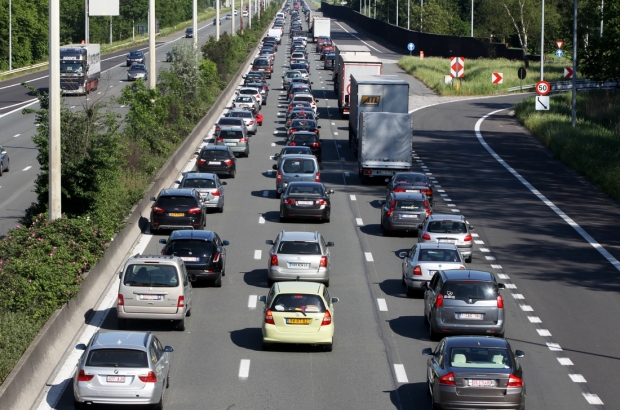- Daily & Weekly newsletters
- Buy & download The Bulletin
- Comment on our articles
Antwerp researchers calculate cost of traffic jams: €200,000 for 15km backup
Transport economists at the University of Antwerp have devised a way to calculate the economic impact of traffic jams with the development of a new tool.
The researchers have determined that a 15km traffic jam on the E19 motorway, for example, comes with the price tag of over €200,000 in terms of the direct and social costs.
The aim is for the tool to be a resource for both transport companies and policymakers looking to ease the burden of traffic jams on the economy.
“Transport companies can start to negotiate more concretely with customers and to calculate congestion surcharges in more specific terms,” explained Thierry Vanelslander, professor at the University of Antwerp.
“With information about congestion in a particular area or along a particular road, companies can also determine more precisely where they should locate their activities.”
Such costs are not currently included in the price of transport because until now, they have been difficult to calculate.
Another hope is that policymakers can use the results of this tool to identify areas where congestion impact is high and then prioritise these zones when developing traffic solutions.
Vanelslander, along with researchers Els Struyf, Christa Sys and Eddy Van de Voorde, divided the cost of traffic jams into multiple categories.
These include direct costs – such as wages, interest and depreciation, insurance, transport costs, fuel costs and maintenance costs – as well as indirect costs, such as rescheduling deliveries or meetings and employees working overtime to account for delays or tackle the rescheduling tasks.
These indirect costs are situation-dependent and therefore difficult to calculate, but social costs such as air and noise pollution and traffic accidents are concrete and measurable.
In a case study for the framework, the researchers used a traffic jam following an accident on the E19 motorway on a working day after the morning rush hour, which resulted in a back up of vehicles spanning a distance of 15.1km.
Due to this traffic jam, the average speed of traffic was only 10km/h. After mapping all the vehicles in the traffic jam and breaking down the costs for all types of transport (trucks, vans, commuting and personal trips), the researchers concluded that the traffic jam cost €202,766.91.
The duration and length of the traffic jam are the variables that have the greatest financial impact.
This tool is the first of its kind in that it can calculate the cost of traffic jams in a highly specific way while being universally useful.
In addition to helping policymakers draft mobility plans, it can be helpful for transport companies around the world to calculate the financial impact of congestion on their business and then possibly pass it on to their customers, even if some variables will need to be adapted to their specific situation.

















